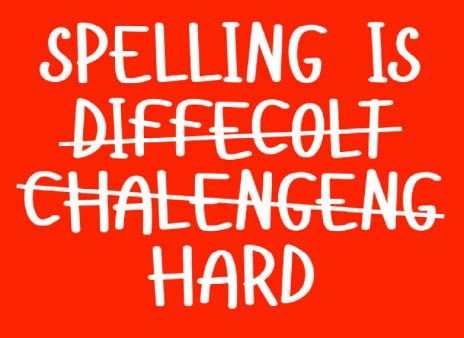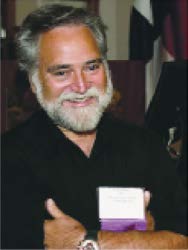RICK RADER, MD ■ EDITOR-IN-CHIEF
Spellbound
It's a given that before I send the draft of this article to the editor of EP Magazine, I will call out the cavalry in the form of spellcheck. I expect that I will be hitting a large number of "ignores" when it turns the corner and encounters the paragraph of intentionally misspelled phrases.
With the popularity of smart phones now at its peak (260 million U.S. users) and emails, texts and messages competing for traditional human communication, we have seen an interesting and often amusing consequence – spelling errors and the abundant excuses for creating them.
It's not unusual to see the "explanation" of the spelling error and the "reason" to excuse them under the sender's signature. It's now commonplace to read, "Please excuse any spelling or grammatical errors sent from my mobile device."
Consider the various attempts at humorous excuse declarations collected by Pravash Pujari. "Consider any misspellings my gift to you." "Typed with thumbs." "Sent via a really tiny keyboard."
"Pardon random autocorrects and fat finger typos." "Warning: I either dictated this to my device, or I typed it clumsily. Expect typos and weirdness." "Sent while walking into stuff, excuse brevity and tpyos." "Don't bother alerting me to any misspellings, this is not a video game."
One can only imagine the response from a professor if you turned in a term paper or thesis with the addendum "Typos happen, but just ignore them." You can be sure that the red pen note scrawled across the top would not read, "Come see me in my orifice as sun as possible."
Perhaps we don't really need to hit the "spell check" key. "Theyre's a reason why your barin can raed this." Natalie Wolchover (both names spelled correctly by the way), writing in LIVE provides:
"For emaxple, it doeson't mttaer in what order the ltteers in a word aepapr, the olny iprmoatnt thing is that the frist and lsat ltteer are in the rghit pcale. The rset can be a total mses and you can still raed it wouthit pobelrm." "S1M1L4RLY, YOUR MIND 15 R34D1NG 7H15 4U70M471C4LLY W17HOU7 3V3N 7H1NK1NG 4BOU7 17."
When I typed the above, obvious misspellings my computer screen had more red underlined words than a manuscript from the CIA.
So how exactly does the brain interpret misspellings, correct them, process them and move on?
Marta Kutyas, a cognitive neuroscientist and the director of the Center for Research in Language at the University of California, San Diego suggests that "context" is the key. "We use context to pre-activate the areas of our brains that correspond to what we expect – we're reading the passage perfectly, because you automatically (and subconsciously) went back and filled in any gaps in your knowledge, based on subsequent context – the words that came later."

SPELLING DISASTER: "One spelling mistake can destroy your life. A husband sent this to his wife: 'I'm having a wonderful time. Wish you were her.'"
Our brains process all the letters of a word at once, rather than one at a time. In the case of the words where the letters are mixed in with numbers, it appears that the digits have a weaker influence on our brains than their actual status as digits. Our brains allow us to ignore the detours and get right down to the meat (and meaning).
One spelling mistake can destroy your life. A husband sent this to his wife: "I'm having a wonderful time. Wish you were her."
It's a given that before I send the draft of this article to the editor of EP Magazine (Exceptional Parent), I will call out the cavalry in the form of spellcheck. I expect that I will be hitting a large number of "ignores" when it turns the corner and encounters the paragraph of intentionally misspelled phrases.
The first computer spell checkers were "verifiers" instead of "correctors." They offered no suggestions for incorrectly spelled words. Many educators blame the "correctors" version of spell checker for the "dumbing down" of developing children.
Recent experiments have tracked spelling errors of students writing essays with both a working and non-working spell check capacity. With spell checks off, students with high verbal SAT scores made an average of five auditing errors and students with lower SAT scores made an average of 12.3 errors. With the spell check on, high scoring SAT students made an average of 16 errors, and low-scoring students made 17. The researchers' results were significant, especially when you consider that the experiment was meant to show that spell checkers were more effective for those with high verbal abilities. Instead, their results showed that groups were worse with the spell checker on."
But in the corridors of spelling excellence, all is not lost. There is one group of students that could teach "spell check" a thing or two about how to line up letters to make words appear the way they were intended. Competitors in the 2019 Scripps National Spelling Bee were able to handle the following words in the final rounds of competition. And even if this were an "open book" exam, spell check would have been sidelined. It was a perfect setting for that awkward moment when you spelled a word so wrong that even autocorrect was like, "I got nothing man…"
Vibratiuncle (a slight vibration). Aufgabe (a task or exercise, especially when assigned experimentally). Rijsttafel (An Indonesian midday meal). Macclesfield (a silk with small allover patterns used especially for neckties). Marmennill (a fabled marine male creature).
While parents of children with special needs would appear dumbfounded if confronted with any of those words, they quickly raise their eyebrows when they find the following words (in Individual Education Plans) not necessarily misspelled, but missing: Inclusion. Therapy. Support. Individual. Accommodation. Assistance. Restricted. Unavailable.
By the way, "exceptional" has two e's. •

ANCORA IMPARO In his 87th year, the artist Michelangelo (1475 -1564) is believed to have said "Ancora imparo" (I am still learning). Hence, the name for my monthly observations and comments. – Rick Rader, MD, Editor-in-Chief, EP Magazine Director, Morton J. Kent Habilitation Center Orange Grove Center, Chattanooga, TN